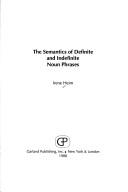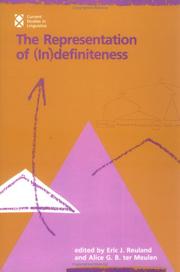| Listing 1 - 10 of 73 | << page >> |
Sort by
|
Book
ISBN: 3050080094 Year: 2019 Publisher: Berlin : Akademie Verlag,
Abstract | Keywords | Export | Availability | Bookmark
 Loading...
Loading...Choose an application
- Reference Manager
- EndNote
- RefWorks (Direct export to RefWorks)
Book
ISBN: 9791030003574 Year: 2019 Publisher: Pessac Presses universitaires de Bordeaux
Abstract | Keywords | Export | Availability | Bookmark
 Loading...
Loading...Choose an application
- Reference Manager
- EndNote
- RefWorks (Direct export to RefWorks)
"Les indéfinis sont des objets nominaux sans référence préétablie. Alors que les définis sont présumés connus dans leur contexte d'énonciation, les indéfinis présentent des objets, ou des collections d'objets, dont la référence est formée par leur utilisation même dans l'énoncé. Cette utilisation permet, ou non, la spécification qui est l'axe essentiel de l'étude faite dans ce livre des indéfinis du français, pronoms ou groupes nominaux. Les objets linguistiques ciblés sont donc essentiellement des pronoms ou des déterminants, l'indéfinition étant une propriété du groupe nominal. Hors spécification, on a affaire à des représentations nominales sans statut référentiel : que peut représenter cinq élèves en emploi isolé ? Une collection d'objets à quantité précise, mais globalement un objet sans référence, une "combinaison" au sens mathématique, qui peut prendre toutes sortes de valeurs, devenant référentielle dans cinq élèves ont obtenu un prix ou non dans à moins de cinq élèves, aucun cours ne sera ouvert. Ce livre est donc une étude détaillée de la détermination en français, dont l'axe est la spécificité. Parmi les modes de construction des indéfinis, très variés comme on le verra, figure comme essentiel le lien qui rattache l'objet indéfini à son ensemble de référence. Ce lien peut être rendu explicite par l'emploi d'un mot à extension large, entre préposition et déterminant par ses propriétés, de. C'est un élément constitutif de nombreuses constructions indéfinies, qui a pu définir de façon large comme un opérateur de partitivité. Le livre présente d'abord l'approche de l'indéfinition qui sera utilisée, puis dans le second chapitre une étude détaillée des constructions en de partitif. Il examine ensuite, en allant du plus spécifié vers le moins spécifié, les emplois des formes, pronoms ou déterminants, qui construisent des groupes nominaux indéfinis."--Page 4 of cover.
Grammar --- French language --- Definiteness. --- Partitives.
Book
ISBN: 9780199665297 019966529X 0191779733 0191643106 Year: 2015 Publisher: Oxford Oxford University Press
Abstract | Keywords | Export | Availability | Bookmark
 Loading...
Loading...Choose an application
- Reference Manager
- EndNote
- RefWorks (Direct export to RefWorks)
This book brings together novel work on the semantics and pragmatics of certain indefinite expressions that also convey modality. These epistemic indefinites are determiners or pronouns that signal ignorance on the part of the speaker, such as German irgendein and Spanish algun: the sentence Maria se caso con algun medico ('Maria married some doctor or other') both makes an existential statement that there is a doctor that Maria married and signals the speaker's inability or unwillingness to identify the doctor in question. Although epistemic indefinites have featured in recent semantic literature, a full understanding of the phenomenon is still lacking: there is currently no agreement on the source of their epistemic component; there is insufficient cross-linguistic data to develop a semantic typology of these items; and the parallelisms and differences between epistemic indefinites and other expressions that convey epistemic modality have not been explored in depth. In this volume, a team of experts in the field offer novel empirical observations and important theoretical insights on epistemic indefinites and related topics such as modal free relatives, modified numerals, and epistemic modals. They provide a coherent overview of the issues that shape the subject as well as placing them in the context of current semantic research, moving towards the development of a semantic typology of epistemic indefinites that explores the place of these expressions within a general typology of modal items
Lexicology. Semantics --- Grammar --- Pragmatics --- Definiteness (Linguistics) --- Modality (Linguistics) --- Semantics. --- Definiteness (Linguistics). --- Modality (Linguistics).
Book
ISBN: 9782840509875 2840509873 Year: 2015 Volume: 14 Publisher: Paris : Presses de l'Université de Paris-Sorbonne,
Abstract | Keywords | Export | Availability | Bookmark
 Loading...
Loading...Choose an application
- Reference Manager
- EndNote
- RefWorks (Direct export to RefWorks)
Comment se fait-il que, dans une langue à ordre libre comme le latin, certains mots soient soumis à des contraintes de placement ? Les indéfinis quis (quelque/quelqu’un), quisque (chaque/ chacun) et alius (autre) présentent de telles contraintes : apparition après certaines négations ou conjonctions pour quis ; après superlatif, réfléchi, numéral ordinal, relatifs et certaines conjonctions pour quisque ; formes diverses de quantification lorsqu’il y a occurrences multiples d’alius. Il est remarquable qu’inversement les correspondants de ces indéfinis dans des langues à ordre fixe soient souvent « flottants » (each/chacun, l’un…l'autre). Alors que les grammaires actuelles donnent la liste hétérogène des termes qu’ils doivent suivre, cet ouvrage propose à la fois une étude de ces indéfinis en les comparant avec ceux qui ne sont pas soumis aux mêmes contraintes (aliquis, unusquisque), une analyse des différents types de quantification associés à ces placements (quantification universelle, distributivité bi-nominale, distributivité réflexive ou oppositive) et une théorie syntaxique du latin comprenant une dimension géométrique, qui permet une présentation unifiée de phénomènes apparemment hétérogènes. Il offre ainsi une approche nouvelle du latin, qui en explique les emplois en combinant les dimensions logico-sémantique et syntaxique de la langue.
Latin language --- Definiteness --- Syntax --- Determiners --- Latin language - Definiteness --- Latin language - Syntax --- Latin language - Determiners
Book
ISBN: 3961101922 9783961101924 3961101930 Year: 2019 Publisher: Berlin Language Science Press
Abstract | Keywords | Export | Availability | Bookmark
 Loading...
Loading...Choose an application
- Reference Manager
- EndNote
- RefWorks (Direct export to RefWorks)
Definiteness has been a central topic in theoretical semantics since its modern foundation. However, despite its significance, there has been surprisingly scarce research on its cross-linguistic expression. With the purpose of contributing to filling this gap, the present volume gathers thirteen studies exploiting insights from formal semantics and syntax, typological and language specific studies, and, crucially, semantic fieldwork and cross-linguistic semantics, in order to address the expression and interpretation of definiteness in a diverse group of languages, most of them understudied.
Linguistics --- Definiteness . --- Linguistic science --- Science of language --- Language and languages

ISBN: 0824051882 Year: 1983 Publisher: Ann Arbor (Mich.) : University microfilms international,
Abstract | Keywords | Export | Availability | Bookmark
 Loading...
Loading...Choose an application
- Reference Manager
- EndNote
- RefWorks (Direct export to RefWorks)
Grammar, Comparative and general --- Definiteness (Linguistics). --- Semantics (Philosophy). --- Noun phrase.
Book
ISBN: 0815328710 Year: 1997 Publisher: New York (N.Y.): Garland
Abstract | Keywords | Export | Availability | Bookmark
 Loading...
Loading...Choose an application
- Reference Manager
- EndNote
- RefWorks (Direct export to RefWorks)
Definiteness (Linguistics) --- Grammar, Comparative and general --- Semantics --- Number

ISBN: 0262181266 9780262181266 Year: 1987 Volume: 14 Publisher: Cambridge (Mass.): MIT press
Abstract | Keywords | Export | Availability | Bookmark
 Loading...
Loading...Choose an application
- Reference Manager
- EndNote
- RefWorks (Direct export to RefWorks)
Book
ISBN: 9789027255945 Year: 2014 Publisher: Amsterdam Benjamins
Abstract | Keywords | Export | Availability | Bookmark
 Loading...
Loading...Choose an application
- Reference Manager
- EndNote
- RefWorks (Direct export to RefWorks)
Grammar, Comparative and general --- Definiteness (Linguistics) --- Indefiniteness (Linguistics) --- Determinatives (Linguistics) --- Determiners (Linguistics) --- Determiners. --- Linguistics --- Classifiers (Linguistics) --- Determiners --- Definiteness (Linguistics). --- Philology
Book
ISBN: 3484304987 3110914875 Year: 2011 Volume: 498 Publisher: Tübingen : Max Niemeyer Verlag,
Abstract | Keywords | Export | Availability | Bookmark
 Loading...
Loading...Choose an application
- Reference Manager
- EndNote
- RefWorks (Direct export to RefWorks)
In dieser Studie wird eine syntaktische und semantische Eigennamentheorie vorgeschlagen, die zum einen die Distribution des definiten Artikels bei Eigennamen sowie dessen Verhältnis zu Gattungsnamen beschreiben und erklären kann. Die Argumentation bewegt sich auf drei verschiedenen Ebenen: In Bezug auf die referenzielle Ebene werden hauptsächlich sprachphilosophische (Frege, Russell und Kripke), aber auch linguistische Ansätze diskutiert (u.a. Haas-Spohn, von Heusinger). In Verbindung mit der referenziellen Ebene wird ein semantisches Modell vorgeschlagen, das im Wesentlichen auf von Heusingers Salienztheorie beruht: Eine zentrale Annahme besteht darin, dass Eigennamen -- anders als etwa in Kripkes Kausaltheorie -- semantisch gesehen eine komplexe Struktur aufweisen, indem sie als kontextunabhängige Ausdrücke zu analysieren sind. Auf der Basis der semantischen Analyse wird eine syntaktische Analyse dargelegt, die -- auf Grewendorf und Sternefeld aufbauend -- im Rahmen des minimalistischen Programms formuliert wird: In Verbindung mit der DP-Hypothese werden Eigennamen als inhärent definit aufgefasst, das heißt, Eigennamen weisen das Merkmal [+definit] auf. Ein wichtiges Ziel besteht zudem darin, die semantische und syntaktische Ebene miteinander zu verbinden.
Definiteness (Linguistics) --- Names. --- Definiteness (Linguistics). --- Nomenclature --- Proper names --- Terminology --- Epithets --- Language and languages --- Indefiniteness (Linguistics) --- Linguistics --- Grammar, Comparative and general --- Etymology --- Determiners
| Listing 1 - 10 of 73 | << page >> |
Sort by
|

 Search
Search Feedback
Feedback About UniCat
About UniCat  Help
Help News
News